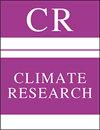伊朗西南部农民对气候变化和用水的适应性:转换回归的应用
IF 1.6
4区 地球科学
Q4 ENVIRONMENTAL SCIENCES
引用次数: 0
摘要
摘要:气候变化对发展中国家农业部门的影响已在科学界和政界进行了广泛讨论。本研究侧重于气候变化对农业部门的影响,并调查适应措施及其对农业用水量的影响。具体而言,本研究探讨了农民为应对气候变化而采取的适应措施如何影响用水量。首先使用选择模型来研究影响农民采取适应气候变化策略的因素。然后,应用内生转换回归模型和反事实分析来量化适应策略对用水量的影响。为了评估所引入模型的有效性,研究人员选择了伊朗胡齐斯坦省巴维县的农民作为样本人群。2022-2023 年,采用多阶段随机抽样方法对 335 名农民进行了调查,收集了相关数据。调查结果表明,教育程度、获得农业推广服务的机会、年龄和距离市场的远近对采取适应措施有显著影响。对各种情况的分析表明,与不采取适应措施的农民相比,采取适应措施的农民的平均用水量明显降低。具体而言,水管理措施的效果最为明显,每公顷用水量减少了 2277 立方米。这些结果对于制定公共政策和农业推广计划,促进农民成功采用适应战略具有重要参考价值。本文章由计算机程序翻译,如有差异,请以英文原文为准。
Farmers’ adaptation to climate change and water consumption in southwest Iran: application of switching regression
ABSTRACT: The effects of climate change on the agricultural sector in developing countries have been discussed to a considerable extent in scientific and political circles. This study focuses on the effects of climate change on the agricultural sector and investigates adaptation measures and their effects on agricultural water consumption. Specifically, this study investigates how farmers’ adaptation measures in response to climate change affect water consumption. A choice model was first used to study the factors influencing the adoption of strategies to adapt to climate change by farmers. Then, an endogenous switching regression model and counterfactual analysis were applied to quantify the effect of adaptation strategies on water consumption. To assess the effectiveness of the model introduced, farmers of Bavi County in Khuzestan province, Iran, were chosen as a sample population. Data were collected in a survey of 335 farmers using a multi-stage random sampling method in 2022-2023. The findings indicated that education, access to agricultural extension services, age, and proximity to the market significantly influenced the adoption of adaptation measures. Analysis of various scenarios demonstrated that farmers implementing adaptation strategies had notably lower average water consumption compared to those who did not. Specifically, water management practices had the most substantial effect, reducing water usage by 2277 m3 ha-1. These results are valuable for informing the development of public policies and agricultural extension programs aimed at promoting successful adaptation strategies among farmers.
求助全文
通过发布文献求助,成功后即可免费获取论文全文。
去求助
来源期刊

Climate Research
地学-环境科学
CiteScore
2.90
自引率
9.10%
发文量
25
审稿时长
3 months
期刊介绍:
Basic and applied research devoted to all aspects of climate – past, present and future. Investigation of the reciprocal influences between climate and organisms (including climate effects on individuals, populations, ecological communities and entire ecosystems), as well as between climate and human societies. CR invites high-quality Research Articles, Reviews, Notes and Comments/Reply Comments (see Clim Res 20:187), CR SPECIALS and Opinion Pieces. For details see the Guidelines for Authors. Papers may be concerned with:
-Interactions of climate with organisms, populations, ecosystems, and human societies
-Short- and long-term changes in climatic elements, such as humidity and precipitation, temperature, wind velocity and storms, radiation, carbon dioxide, trace gases, ozone, UV radiation
-Human reactions to climate change; health, morbidity and mortality; clothing and climate; indoor climate management
-Climate effects on biotic diversity. Paleoecology, species abundance and extinction, natural resources and water levels
-Historical case studies, including paleoecology and paleoclimatology
-Analysis of extreme climatic events, their physicochemical properties and their time–space dynamics. Climatic hazards
-Land-surface climatology. Soil degradation, deforestation, desertification
-Assessment and implementation of adaptations and response options
-Applications of climate models and modelled future climate scenarios. Methodology in model development and application
 求助内容:
求助内容: 应助结果提醒方式:
应助结果提醒方式:


